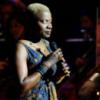Cal Performances couldn’t have engineered a better season kickoff than a joyous collaboration between Beninese superstar singer Angélique Kidjo and cello maestro Yo-Yo Ma.
Co-leaders of the project Sarabande Africaine, which explores the oft-overlooked African roots of diverse music from J.S. Bach to Dvořák to Edith Piaf, the sultry concert on Saturday, Aug. 30, at the Greek Theatre in Berkeley (also heard at the Hollywood Bowl in Los Angeles on Thursday, Aug. 28) gracefully ranged across a universe of possibilities and settings. There were sublime solo cello pieces, intimate duets between Kidjo and Ma, and a sprightly quartet featuring pianist Thierry Vaton and percussionist David Donatien, who both hail from Martinique.
A West African hand-drum battery opened the show with a brief percussion benediction, and later a full rock band with two horn players took the stage for “Voodoo Child,” a performance that unleashed Ma’s inner Jimi Hendrix (sans guitar feedback). The absence of Sudanese American rocker Sinkane, listed in the program as a special guest, went unnoted, but it’s hard to imagine his charismatic presence could have lifted the concert much higher.
The nearly two-hour performance was often at its most riveting when the stage was least populated. After the percussion welcome came several duo pieces, including Kidjo’s soaring take on the incantatory “Blewu,” a song by short-lived Togolese vocalist Bella Bellow. Her thick contralto, emerging instantly at full intensity, felt like a physical force with its own rhythmic impetus, buoyed rather than propelled by Ma’s cello.
Joined by Vaton and Donatien, she and Ma brought simmering drama to “Yemandja,” the second movement from Ifé: Three Yorùbá Songs, a suite that Philip Glass composed for Kidjo. The piece, arranged by Michael Riesman, ushered her voice into markedly different terrain — more compressed, less dynamic, but still majestically commanding.
By contrast, her take on Gershwin’s “Summertime,” sung in Swahili and French, shed its nostalgia, turning the familiar lullaby into something alluringly new.
The concert pivoted around a gorgeous solo medley by Ma that moved seamlessly from the lamenting spiritual “Nobody Knows the Trouble I’ve Seen” to the beatific “Goin’ Home” from Dvořák’s “New World" Symphony to the Sarabande theme from one of Bach’s Suites for Solo Cello. Seemingly indifferent to the temptation of virtuosic display, Ma inhabited each melody with open-hearted soul. Afterward, he detailed the North African origins of the sarabande dance, a central thread in the project’s loose narrative tracing African musical DNA around the globe.
From the beginning Ma was a smooth and ingratiating host, offering a hearty welcome to returning undergrads and graduate students with a spirited “Go Bears!” His easy rapport with Kidjo, whether prompting her with questions about their material or describing meeting seven years ago (“It was love at first sight,” he said), brought an uncommon intimacy to the spacious venue.
That fateful first encounter took place in 2018 at Paris’s centennial commemoration of the end of World War I. Kidjo said she participated to highlight the often forgotten sacrifices made by African soldiers during the epochal conflagration. Today, in her work as a UNICEF Goodwill Ambassador and champion of women’s rights and educational opportunities for girls, the Brooklyn-based singer stands as much more than an ever-evolving artist. Just in the past few years, she’s manifested on Berkeley stages amplifying the Afrobeat grooves powering the 1980 Talking Heads album Remain In Light, foregrounding the African roots of Cuban salsa legend Celia Cruz’s music, and co-writing and starring in Yemandja, a musical production exploring the trans-Atlantic slave trade from a Beninese perspective.
In Ma, she’s found a similarly protean artist whose musical adventures have taken him from the Silk Road to Rio de Janeiro. The difference is that Ma subsumes his conservatory training into the collaboration at hand, while Kidjo infuses everything she touches with a West African rhythmic imperative.
"Sarabande Africaine" explores a whole new set of shapes. On “Lonlon,” Kidjo delivered her original lyrics for Maurice Ravel’s Bolero with the requisite dynamic calibration. She was at her Parisian best on “La Foule,” which set the chanson standard indelibly linked to Piaf to a galloping vals Peruano groove. And her Yoruban lyric for a theme from Bach’s Keyboard Concerto No. 5, recited by Ma in English beforehand, transformed the melody into a supplication for the safety of girls in conflict zones.
The evening roared to a close with a blast of energy, as Kidjo and the full ensemble reimagined “Once In a Lifetime,” compressing the Talking Heads number to its essence while adding another current to the aqueous theme running through much of the program. In ending the concert with Miriam Makeba’s international hit “Pata Pata,” Kidjo tipped her wrap — which she’d dramatically shed a few songs earlier — to the pioneering Mama Africa, a mantle that she’s made her own.




